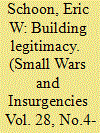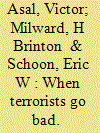| Srl | Item |
| 1 |
ID:
153612


|
|
|
|
|
| Summary/Abstract |
Previous research has identified a variety of general mechanisms to explain how insurgents build legitimacy. Yet, there is often a gap between these mechanisms and the interactional dynamics of insurgencies. This article attempts to bridge this gap through a theoretically informed analysis of the Kurdistan Workers’ Party’s (PKK) insurgency in Turkey. I show how the PKK’s efforts to cultivate legitimacy, Turkey’s counterinsurgency strategies, and civilian perceptions of the PKK, all mutually influenced one another. Based on this analysis, I argue that the mechanisms that produce popular legitimacy coevolve with insurgents’ behaviors, states’ interventions, and civilians’ perceptions.
|
|
|
|
|
|
|
|
|
|
|
|
|
|
|
|
| 2 |
ID:
138303


|
|
|
|
|
| Summary/Abstract |
The intersection of terrorism and organized crime is a central global security concern. However, the conditions that contribute to this intersection or hinder its development are widely debated. Drawing on prominent cases of ideologically driven violent nonstate actors engaged in illicit economies, some scholars argue that this intersection is a logical evolution. Other scholars, focusing on the fact that relatively few groups engage in both organized crime and terrorism, argue that ideological differences hinder this intersection. We use data on 395 terrorist organizations to analyze how organizational and environmental factors affect the likelihood of terrorist involvement in illicit drug trafficking. Our analysis shows that the degree of connectivity within networks of terrorist groups is the most significant predictor of a group engaging in drug trafficking. Further, contrary to the theorized effects of ideology, an explicit religious ideology has no significant effect while an ethnopolitical ideology actually increases the likelihood of drug trafficking.
|
|
|
|
|
|
|
|
|
|
|
|
|
|
|
|